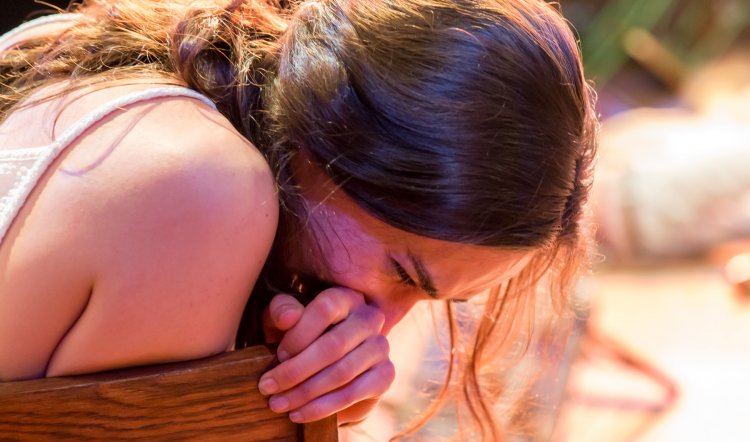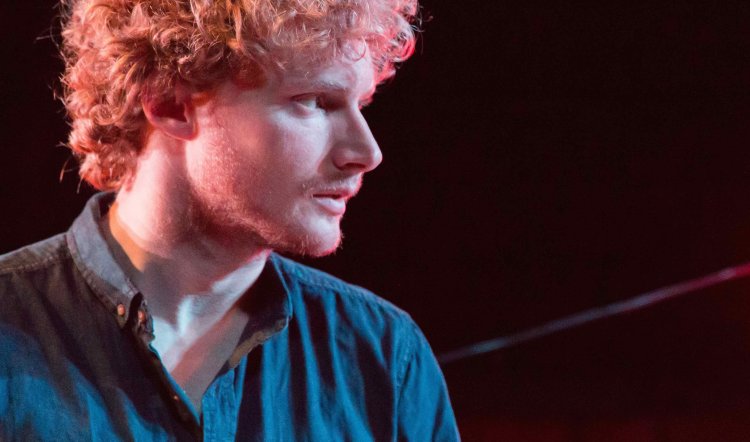
PLATONOV
PLATONOV, presented by MopHead & Catnip Productions at ATYP, 5-22 November 2014. Photography by Matthew Neville: above Matilda Ridgway; right: Charlie Garber.
Written in 1878 by Anton Chekhov when he was just 20, this work of youthful indulgence is also known – in Russian – as A Play Without a Title, Fatherlessness, Don Juan in the Russian Manner and also, Without Patrimony. Its most successful incarnation came in the ’80s when English playwright Michael Frayn adapted it as Wild Honey.
Next year, STC’s Andrew Upton is having a go at it as a vehicle for Richard Roxburgh and Cate Blanchett. Meanwhile, hitherto canny independent producers MopHead & Catnip Productions have had uber-indie director Anthony Skuse take to it with what appears, in this instance, to be a blunt hacksaw…
It should perhaps be remembered that Maria Yermolova, star of the Maly Theatre and for whom Chekhov wrote the play, actually turned it down and it didn’t see the light of foots until 1923. In watching this production it becomes obvious that there are many reasons for this and not all of them to do with the original running time of between five and six hours – which is mercifully halved in this version.
Why does the play – under whichever title you fancy – continue to fascinate theatre makers? Would it do so if its creator was not Anton Chekhov? I suspect not. If it were by – say – the 20-year-old David Williamson or 20-year-old Joanna Murray-Smith, I’d put bets on its reception being sneering at best and non-existent as most likely.
The précis given for the 2013 Yale School of Drama version, translated by Ilya Khodosh makes it sound quite appealing: “Relatives, neighbours, paramours, and creditors descend upon a provincial Russian estate to celebrate the summer solstice at the twilight of the 19th century. As small talk gives way to deeper passions and grievances, can lifelong friendships and relationships withstand the pressure? Progressive ideals square off against frightened and insatiable egos, as a changing society hurtles toward the unknown.”
It’s impossible to recognise the above in this interpretation, however, but to be fair if you have five to six hours of text to choose from, there is every chance one set of choices will produce a quite different end result. This reading is described, in its publicity hand-out, in ways that seem to be more revealing of the author’s ideas about Chekhov’s contemporary appeal and audience than the play itself: “If you're looking for a stiff, tedious night of social intercourse Chekhov-style, this show is not for you. Platonov is an event of epic proportions, including 14 performers and live music…”

So… the writer’s experience of Chekhov is stiff, tedious nights of social intercourse. You have to wonder which productions s/he has seen to develop such a sad, sour view. Certainly not Kate Gaul’s Seagull, nor Simon Stone’s Cherry Orchard, nor Andrew Upton’s Uncle Vanya – all wildly different yet united by the absence of stiffness or tedium, never mind social intercourse, whatever that is.
And the writer mistakes “epic” for merely large. Nicholas Nickleby was epic. The Mahabharata was epic. Cloudstreet, despite its length and large cast, was not epic, just marvellous. Truth is there is much more to “an epic event” than too many actors doing too little for too long. The live music – actually a cappella singing by all 14 members of the cast – is nice, however.
Fourteen actors are about seven too many, however, and most have little that’s meaningful to do. The exceptions are, of course, the luminous and magnetic Matilda Ridgway as Platonov’s wife Sasha and the man himself, played with loose-limbed charm and conviction by Charlie Garber. Sasha looks on in gullible and pained disbelief as Platonov’s latest dalliances come calling.
There’s the cougar countess Anna (Suzane Pereira) and a heartbroken wife and would-be elopee Sofya (Geraldine Hakewill); these two at least have the stage time to develop some sense of character and presence. For the rest, it ranges from much more difficult to impossible: Gary Clementson, Amy Hack, Graeme McRae, Sam O’Sullivan, Jason Perini, Eloise Snape, Dorje Swallow, Sam Trotman, Terry Karabelas and Edward McKenna.
For what feels like most of a long Russian summer, but is actually only a couple of hours, a lot of vodka is consumed; boredom is discussed as are lust, love and loss. You can sort of see why one of the play’s titles is Don Juan in the Russian Manner. Yet why it remains of interest in the 21st century as anything other than a curiosity is a mystery in this interpretation. It’s intermittently a bit amusing, occasionally a bit tragic but ultimately a mish-mash of not very much aside from Ridgway and Garber who are as misleadingly and effortlessly excellent as we’ve come to expect.



